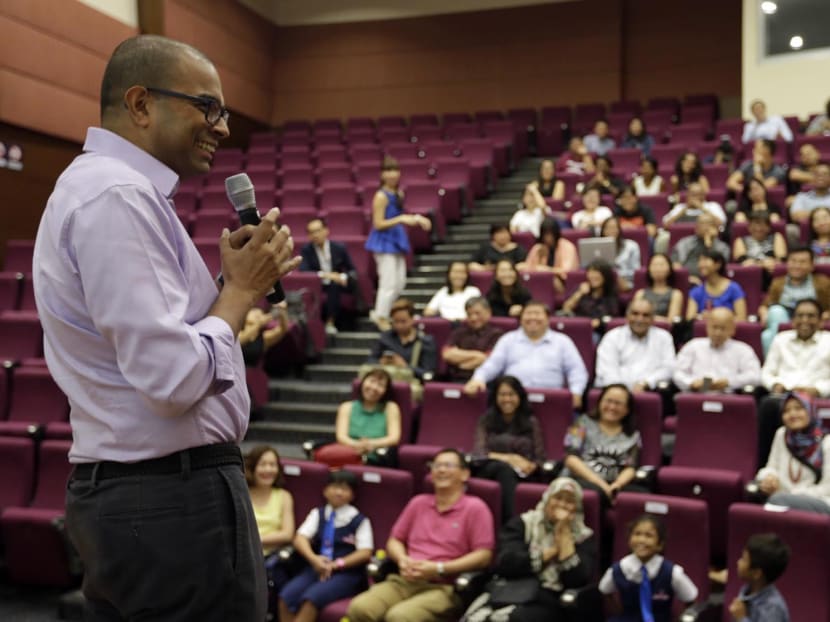Race issues get an airing in TV documentary
SINGAPORE — While nearly all of the respondents in a nation-wide survey felt that everyone should be treated equally, about half continue to hold negative stereotypes of people of other races, such as certain races are lazy, violent or more likely to get into trouble.

Discussions of race today are coloured and affected by things happening around the world, said OnePeople.sg chairperson Janil Puthucheary. Photo: Wee Teck Hian
SINGAPORE — While nearly all of the respondents in a nation-wide survey felt that everyone should be treated equally, about half continue to hold negative stereotypes of people of other races, such as certain races are lazy, violent or more likely to get into trouble.
The findings were from a survey jointly conducted by Channel NewsAsia (CNA) and the Institute of Policy Studies, which were used in an one-hour documentary dealing with the issue of race in Singapore.
During a special screening on Thursday (Aug 11), the documentary titled Regardless of Race, saw OnePeople.sg chair Janil Puthucheary speak to various Singaporeans on what they were willing and unwilling to say about race.
OnePeople.sg is an organisation which works to promote racial harmony.
The documentary will be aired on CNA on Monday (Aug 15) at 8pm.
During the survey, conducted in June and July this year, 96 per cent of some 2,000 respondents claimed that they respect people of all races and feel that everyone should be treated equally.
Yet, about half of them continue to have negative stereotypes of other races, thinking that people from certain races are more violent, less friendly, are lazier and are more likely to get into trouble.
Also, 33 per cent of the respondents did not trust some people from certain races.
Speaking to the media after the screening, Dr Puthucheary pointed out that discussions of race today are coloured and affected by things happening around the world.
Prejudices are to some extent strengthened by what Singaporeans see in other nations and are accelerated by social media, he added.
“The issue of someone taking offence and that offence spreading very quickly is heightened in today’s world,” he said.
The documentary also cited recent incidents involving race highlighted by social media: A Malay man was insulted when a child told his father he did not “want to sit beside Malay people” at the cinema; and a Facebook user claimed that a staff from bakery chain PrimaDeli had made racist remarks towards her during a job interview.
The survey findings revealed that 20 per cent of the respondents did not think it is racist to not hire someone based on their race.
Twenty-seven per cent did not think it is racist to comment that people of a particular race are lazy, dirty or money-minded, while 35 per cent did not think it is racist if they refuse to share a seat with someone from another race.
Making reference to the Sedition Act in the documentary, Dr Puthucheary noted that it is meant to prohibit any action that instills ill-will among races but does not stop Singaporeans from talking about race.
Likewise, a common narrative in Singapore has been that multi-racial harmony is not a given and it is important to exercise sensitivity, he said. “On the surface, this exercise in caution has worked really well, but has it had an unintended effect, has it made people afraid to talk about race?” asked Dr Puthucheary.
In fact, the survey found that more than half thought it is hard to talk about race, with six in 10 of the respondents felt that it would offend others. About half thought that the minorities are also becoming too sensitive when race issues are broached.
The documentary also raised questions if children have the opportunity to understand deeper race issues beyond Racial Harmony Day in schools, after speaking to some nine-year-olds.
The survey had found that 43 per cent of the parents do not tell their children what might offend other races, while 41 per cent do not tell their children that racism is bad.
During the dialogue session after the documentary screening, participants also shared their views on discussions of race and the issue of majority privilege.
Mr Michael Heng, a principal consultant at Peopleworldwide, said he has always taught his son to respect people, not just based on their race, and also disagreed that the majority race here is privileged.
However, others also questioned the relevance of the Chinese, Malay, Indian and Other (CMIO) race categorisation in Singapore today.
Responding to these questions, Dr Puthucheary acknowledged that it is an “imperfect system”.
But without such categorisation, Singapore will not be able to guarantee that racial ghettos would not exist, that primary schools will continue to have a mix of races, and that mother tongues would be preserved, among other things.
Some of the policies today are interventionist to ensure racial harmony. “CMIO is not a minority issue, it’s about a national identity issue,” said Dr Puthucheary.
He added that more dialogues will be held with OnePeople.sg. They will also try to reach out to a broader audience that is not confined within educational or formal spaces, Dr Puthucheary said.









